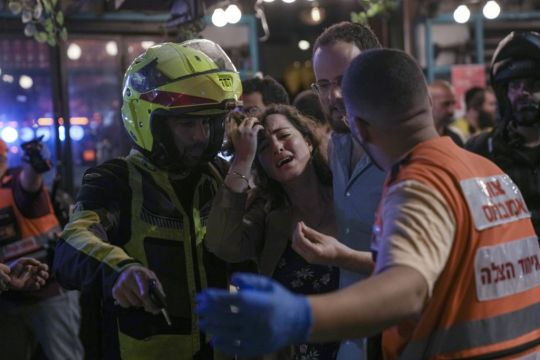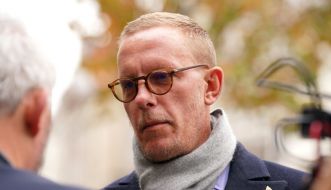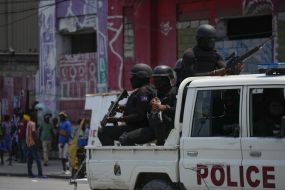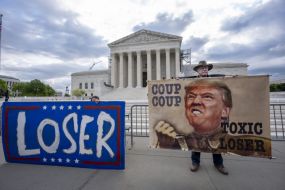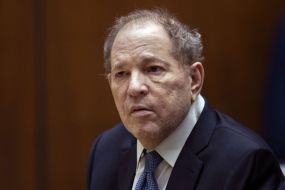Israeli security forces hunted down and killed a Palestinian man who opened fire into a crowded bar in central Tel Aviv, killing two and wounding over 10 in an attack that caused scenes of panic in the heart of the bustling city.
It was the fourth deadly attack in Israel by Palestinians in three weeks and came at a time of heightened tensions around the start of the Islamic holy month of Ramadan.
Tens of thousands of Palestinians attended the first Friday prayers of the holy month in Jerusalem amid a heavy Israeli security presence, with no immediate reports of unrest.
Israeli Prime Minister Naftali Bennett met senior security officials on Friday and announced that a major crossing in the northern West Bank near the attacker’s home town would be closed indefinitely.
“Every murderer will know that we’ll get to him, and anyone who helps terrorists should know that the price he will pay will be unbearable,” he said in a statement.

It was not immediately clear whether Israel would proceed or alter its plan to allow Palestinian worshippers to enter Jerusalem.
Protests and clashes in the holy city during Ramadan last year eventually ignited an 11-day Gaza war.
“We will widen our actions against the wave of terror through offence, defence and intelligence,” defence minister Benny Gantz said ahead of the meeting.
“The price that we will extract from the attackers and those who send them will be heavy.”
Thursday’s shooting took place in a crowded bar in Dizengoff Street, a central thoroughfare that has seen other attacks over the years.
Thursday night is the beginning of the Israeli weekend and the area was packed with people in bars and restaurants.
In videos spread on social media, dozens of terrified people were seen running through the streets as police searched for the attacker and ordered people to stay indoors.
Hundreds of Israeli police officers, canine units, and army special forces conducted a massive manhunt throughout the night across Tel Aviv, searching building by building through densely populated residential neighbourhoods.

Early on Friday, authorities said they found the attacker hiding near a mosque in Jaffa, an Arab neighbourhood in southern Tel Aviv, and killed him.
Israeli police chief Kobi Shabtai said his forces, the army and the Shin Bet security agency had spent a “difficult night” tracking down the assailant.
“We succeeded this morning, through intelligence and operational co-operation, to close the circle and to kill the terrorist in a shoot-out,” he said.
The Shin Bet identified the attacker as Raad Hazem, a 28-year-old Palestinian man from Jenin in the occupied West Bank.
It indicated he had acted alone, saying he did not belong to an organised militant group and had no prior record.
It said he had entered Israel illegally without a permit.
The Jenin refugee camp was the scene of one of the deadliest battles of the second Palestinian intifada, or uprising.
In April 2002, Israeli forces fought Palestinian militants in the camp for nearly three weeks.

Some 23 Israeli soldiers and at least 52 Palestinians, including civilians, were killed, according to the United Nations.
The Israeli military frequently conducts arrest raids in Jenin, often coming under fire.
The Palestinian Authority, which administers parts of the occupied West Bank and co-ordinates with Israel on security matters, appears to have little control over the area.
After Thursday’s attack, 13 Israelis have been killed in recent weeks, making this one of the worst waves of violence in years.
The militant Hamas group that rules the Gaza Strip praised the attack but did not claim responsibility.
The attacks have created a challenge for Israeli authorities.
All of the attackers appear to have acted individually or with minimal support from a small cell.
Three of them are believed to have identified with the so-called Islamic State, but militant groups do not appear to have trained them or organised the attacks.

Seeking to avoid a repeat of last year’s war, Israeli, Jordanian and Palestinian leaders have held a flurry of meetings in recent weeks to maintain calm.
Israel has taken a number of steps aimed at calming tensions, including issuing thousands of additional work permits for Palestinians from the Hamas-ruled Gaza Strip.
But the attacks have set off growing calls in Israel for a tougher crackdown.
Prior to the attack, Israel had said it would allow women, children and men over 40 from the occupied West Bank to pray at the Al-Aqsa Mosque in east Jerusalem on Friday, the first weekly prayers of Ramadan.
Tens of thousands were expected to attend, and thousands of police were to be mobilised for the gatherings.
It was not clear how Thursday’s shooting would affect those plans.
The mosque is the third holiest site in Islam and sits on a hilltop that is the most sacred site for Jews, who refer to it as the Temple Mount.
The holy site has long been a flashpoint for Israeli-Palestinian violence.

Israel has worked to sideline the Palestinian issue in recent years, instead focusing on forging alliances with Arab states against Iran.
But the century-old conflict remains as intractable as ever.
Israel captured east Jerusalem, the West Bank and the Gaza Strip in the 1967 Middle East war.
The Palestinians want all three territories to form their future state.
The last substantive peace talks broke down more than a decade ago, and Mr Bennett is opposed to Palestinian statehood, though he supports steps to improve their economy and daily quality of life.
Israel annexed east Jerusalem in a move not recognised internationally and considers the entire city to be its capital.
It is building and expanding Jewish settlements in the occupied West Bank, which most of the international community considers illegal.
It withdrew soldiers and settlers from Gaza in 2005.

But along with neighbouring Egypt, it imposed a crippling blockade on the territory after the militant Hamas group seized power from rival Palestinian forces two years later.
Israel and Hamas have fought four wars since then.
Israel says the conflict stems from the Palestinians’ refusal to accept its right to exist as a Jewish state and blames attacks in part on incitement on social media.
Palestinians say such attacks are the inevitable result of a nearly 55-year military occupation that shows no sign of ending.
